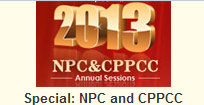Political advisers call for rural pollution control
Top political advisers and government officials are calling for more attention to be paid to environmental pollution in rural areas.
The calls, at the annual two sessions, come as huge amounts of pollutants are being transferred from urban to rural areas, affecting increasing numbers of people.
|
 |
Li Ganjie, vice-minister of environmental protection, said the amount of pollutants discharged into rivers in rural areas has accounted for half the total.
It contributes to 43 percent of the chemical oxygen demand, an index that mainly shows organic pollution in water, Li said.
The problem of solid waste is more severe in rural areas, as disclosed by some members of the National Committee of the Chinese People's Political Consultative Conference.
Zhu Yongxin, a member of the Chinese People's Political Consultative Conference National Committee and vice-chairman of the Central Committee of the China Association for Promoting Democracy, said: "The amount of solid waste generated in rural areas is 190 million metric tons per day, higher than the urban figure of 170 million tons, and a large amount of the urban garbage is being transferred to the countryside.
"The solid waste is piled up in villages, polluting the air, surface, and ground water, and threatening the well-being of about 900 million people in the countryside."
Liu Xiaozhuang, vice-chairman of the Jiangxi Provincial Committee of the CPPCC and a member of the Standing Committee of the Central Committee of the China Democratic League, said the water index in rural areas is deteriorating in all aspects, with quantity shrinking, quality worsening and sources lacking.
"The problem has resulted in many endemic diseases breaking out in rural villages," said Liu. "Such a threat will be brought to cities, as the rivers flow into cities."
A map highlighting more than 200 so-called cancer villages - those with an unusually high incidence of cancers possibly caused by pollution - appeared on the Internet in February.
Although more research is needed on the link between pollution and cancer, medical experts have confirmed that these villages all suffer from different levels of pollution, especially water pollution.


